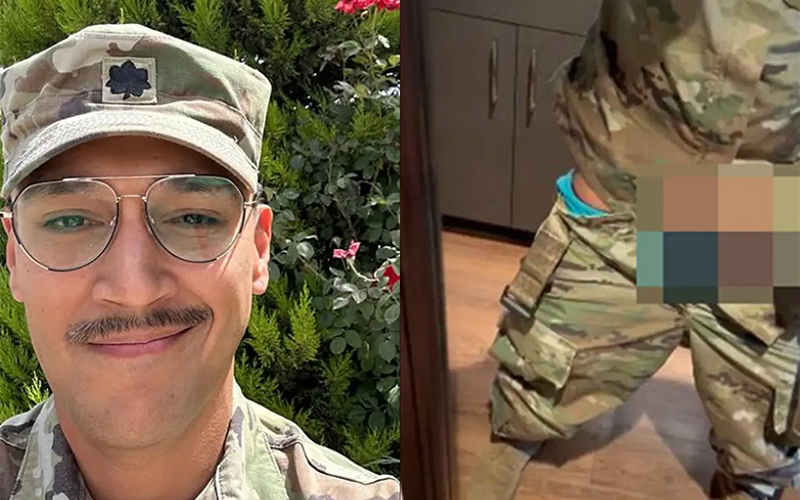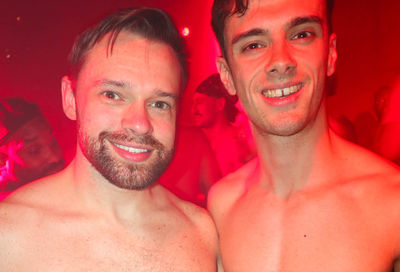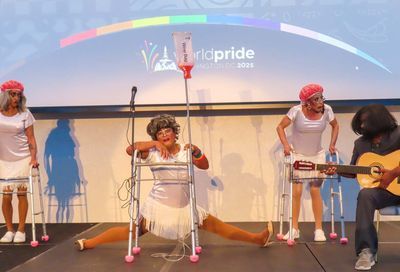Do Tell
American allies extol their gay-inclusive militaries
It was almost embarrassing to be an American at a recent Georgetown University Law Center panel titled, ”Sexual Orientation and Military Preparedness: An International Perspective.”
As members of the militaries of four U.S. allies explained the situation for gays in their respective armed forces, America’s own ”Don’t Ask, Don’t Tell” policy began to sound less like a well-intentioned compromise and more like a woefully out of date, unsophisticated half-measure with as much global standing as the tanking dollar.
Introduced by Thomas F. Field, a Georgetown Law adjunct professor, retired Army colonel, Equality Virginia board member and member of the Servicemembers Legal Defense Network, the one serving officer and three veterans on the panel shared their personal perspectives on the fallout from their militaries allowing openly gay soldiers and sailors. In a word, that fallout would be ”nil.”
”I wouldn’t say it was an overnight thing, but it happened,” began Chief Petty Officer Stuart O’Brien of the Australian Navy. ”It’s a non-issue today in Australia.”
And though it’s still very much an issue in the United States, that did not stop the U.S. Army from decorating O’Brien for his service in Baghdad’s Green Zone.
From Australia to Canada to Great Britain to Israel, the song was the same: We lifted our bans with little or no repercussions, and it will eventually happen in the United States.
”None of those dire predictions were realized,” said Michelle Douglas, director of the International Relations Group for the Canadian Department of Justice, and a veteran of her country’s Special Investigations Unit of the Military Police. ”It can be replicated here.”
Though Douglas was the only panelist to have been discharged for sexual orientation, she shared her fellow panelists’ convictions regarding DADT. After all, going from top graduate of every military training course she took, to a polygraph test regarding her sexual orientation, to having the Canadian armed forces surrender on the eve of her legal challenge, Douglas has plenty of reason to believe change is inevitable. Add to that the story she told the audience of about 100, of having seen two military men get married in a chapel on base by a military chaplain.
Avner Even-Zohar, formerly a captain with the Israeli Defense Forces, said that his country may offer the most direct rebuttal of the strongest arguments against lifting the military’s gay ban here. Whereas some would say that America is more socially conservative than some of its allies, and that military readiness trumps ”social experimentation,” Even-Zohar shot down both arguments. Israel, he pointed out, has no separation between religion and state, making it a very socially conservative country in some aspects. As for military readiness, he insisted, ” ”Without the military, there would be no state of Israel. Israel is very relevant. The Israeli army is engaged in daily fighting, … winning wars on a daily basis.” When the ban — only a decade old to begin with — was lifted in 1993, military readiness was not affected.
The less worthwhile arguments — meaning discussion of group showers and tight quarters — also came up.
”Those who find this a difficult issue should be ashamed of themselves,” said Patrick Lyster-Todd, a retired lieutenant commander in Britain’s Royal Navy, pointing out that troops of any orientation are primarily concerned with washing away dirt and sweat — or sometimes blood and tears. ”We currently need every able-bodied man and woman we can find.”
Following Georgetown’s Catholic tradition, Michael Rankin, a retired U.S. Navy captain, offered to stand in as devil’s advocate. He quoted from critics of lifting the DADT ban, interrupting himself to return to the group-shower brouhaha.
”That sounds absurd to us, but it’s deadly serious to them,” he cautioned.
Support Metro Weekly’s Journalism
These are challenging times for news organizations. And yet it’s crucial we stay active and provide vital resources and information to both our local readers and the world. So won’t you please take a moment and consider supporting Metro Weekly with a membership? For as little as $5 a month, you can help ensure Metro Weekly magazine and MetroWeekly.com remain free, viable resources as we provide the best, most diverse, culturally-resonant LGBTQ coverage in both the D.C. region and around the world. Memberships come with exclusive perks and discounts, your own personal digital delivery of each week’s magazine (and an archive), access to our Member's Lounge when it launches this fall, and exclusive members-only items like Metro Weekly Membership Mugs and Tote Bags! Check out all our membership levels here and please join us today!


















